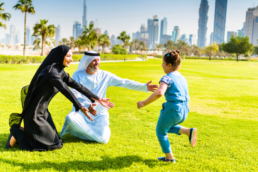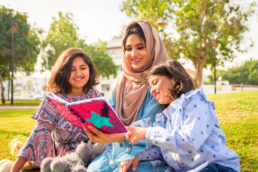CUSTOMS AND RELIGIONS
Dubai, jewel of the United Arab Emirates, is a crossroads of cultures and traditions, deeply rooted in Islam, the state religion. This cosmopolitan metropolis is home to a mosaic of international communities, while preserving its local traditions and customs. For visitors, understanding and respecting these practices is essential for an enriching and respectful experience.

1. Customs in Dubai
Local customs
- Attire: Dubai is relatively liberal compared to other parts of the Middle East, but modest dress is advisable, especially in public places such as shopping malls and restaurants. Shoulders and knees should be covered to respect local sensitivities.
- Greetings: Emiratis prefer warm greetings, often with a handshake. Kissing or hugging someone of the opposite sex in public is not recommended, unless it’s a close acquaintance.
- Public behavior: Public displays of affection between couples are not well received. Respect for quiet and cleanliness in public places is also important, as is respect for queues and private spaces.
Tips for travelers
- Find out about holy days: Fridays are considered a holy day and a day of rest. Many services may be slowed or closed until the afternoon.
- Respect religion and its practices: Avoid criticizing or discussing Islam and religious practices in a negative way. Open-mindedness and respect are key.
- Holiday observance: Islamic holidays such as Eid al-Fitr and Eid al-Adha are celebrated with grandeur. Participating in or simply observing these festivities can enrich your cultural experience.

2. Religion in Dubai
Islam has a significant influence on daily life, laws and social practices in Dubai. Visitors will witness the calls to prayer five times a day and see numerous mosques throughout the city. Ramadan, the holy month of fasting, sees changes in the opening hours of shops and public services, with special meals served after sunset. During this period, it is respectful for non-Muslims to avoid eating, drinking or smoking in public during the day.
Ramadan:
During the month of Ramadan, according to the Islamic calendar, visitors to Dubai are asked to refrain from eating, drinking and smoking in public spaces during the fasting hours, i.e. from sunrise to sunset, out of consideration for those observing the fast. Hotels are nevertheless maintaining their catering services for their guests, with restaurants that remain open, but located so as not to be visible to the public.

3. Good to know
1. Visiting during Ramadan
If you plan to visit Dubai during Ramadan, expect many restaurants to be closed during the day and the atmosphere in the city to be quieter until sunset. This is a fasting period for Muslims, so eating, drinking or smoking in public during the day can be considered disrespectful.
2. Extreme climate
The climate in Dubai can be extremely hot, especially from May to September, when temperatures can easily exceed 40°C. Make sure you stay hydrated and wear sunscreen. If possible, plan outdoor activities early in the morning or late in the afternoon.
3. Transport
Although Dubai offers excellent public transport options, including the metro and cabs, renting a car can be a more convenient option for exploring the city and surrounding area at your own pace. Note that driving in Dubai is on the right, and traffic rules can be very strict.
4. Accommodation and reservations
Dubai is famous for its luxury hotels, but there are also many more affordable options. It’s advisable to book your accommodation well in advance, especially if you’re traveling during the peak tourist season or during major events such as the Dubai Shopping Festival.
5. Use of the Internet and social media
Be careful about how you use social networks and what you post online. Seemingly harmless acts, such as taking a photo of someone without permission, can be illegal. In addition, some websites and e-mail services may be blocked.
6. Currency and payments
The local currency is the UAE dirham (AED). Credit cards are widely accepted, but it’s always a good idea to carry cash for small purchases, especially if you plan to visit local souks or markets.
7. Negotiation and purchasing
Bargaining is commonplace in souks and traditional markets, but less so in shopping malls or fixed stores. Take advantage of your visit to explore the gold, textile and spice souks for an authentic experience.
